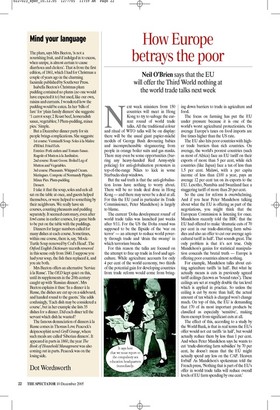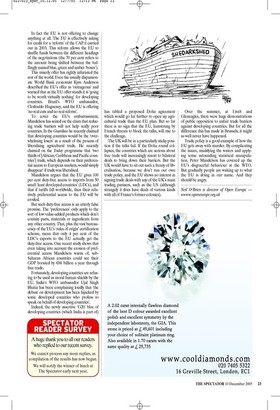How Europe betrays the poor
Neil O’Brien says that the EU will offer the Third World nothing at the world trade talks next week Next week ministers from 150 countries will meet in Hong Kong to try to salvage the current round of world trade talks. All the traditional colour and ritual of WTO talks will be on display: there will be the usual giant papier-mâché models of George Bush devouring babies and incomprehensible sloganeering from people in orange boiler suits and gas masks. There may even be some opportunities (barring any heavy-handed Red Army-style policing) for anti-globalisation protesters in top-of-the-range Nikes to kick in some Starbucks shop windows.
But the sad truth is that the anti-globalisation loons have nothing to worry about. There will be no trade deal done in Hong Kong — and there may never be a deal at all. For this the EU (and in particular its Trade Commissioner, Peter Mandelson) is largely to blame.
The current ‘Doha development round’ of world trade talks was launched just weeks after 9/11. For the US the Doha round was supposed to be the flipside of the ‘war on terror’ — an attempt to reduce world poverty through trade and ‘drain the swamp’ in which terrorism breeds.
For this reason the talks are focused on the attempt to free up trade in food and agriculture. While agriculture accounts for only 4 per cent of the world economy, two thirds of the potential gain for developing countries from trade reform would come from bring ing down barriers to trade in agriculture and food.
The focus on farming has put the EU under pressure because it is one of the world’s worst agricultural protectionists. On average Europe’s taxes on food imports are five times higher than the US rate.
The EU also hits poor countries with higher trade barriers than rich countries. On average, the world’s poorest countries (such as most of Africa) face an EU tariff on their exports of more than 5 per cent, while rich countries (like Japan) face a tax of less than 1.5 per cent. Malawi, with a per capita income of less than £100 a year, pays an average 12 per cent tax on its exports to the EU. Lesotho, Namibia and Swaziland face a staggering tariff of more than 20 per cent.
So the case for reform is overwhelming. And if you hear Peter Mandelson talking about what the EU is offering as part of the negotiations, you might think that the European Commission is listening for once. Mandelson recently told the BBC that the EU had offered to make ‘dramatic cuts of 70 per cent in our trade-distorting farm subsidies and also an offer to cut our average agricultural tariff in half’. That sounds great. The only problem is that it’s not true. Only Mandelson’s genius for statistical manipulation conceals the brutal truth — Europe is offering poor countries almost nothing.
For example, Mandelson talks about cutting agriculture tariffs ‘in half’. But what he actually means is cuts in previously agreed tariff ceilings (known as ‘bound rates’). These ceilings are set at roughly double the tax level which is applied in practice. So unless the ceiling is cut by more than half, the actual amount of tax which is charged won’t change much. On top of this, the EU is demanding that 170 of its most important products be classified as especially ‘sensitive’, making them exempt from significant cuts at all.
The effect of this, according to a study by the World Bank, is that in real terms the EU’s offer would not cut tariffs ‘in half’, but would actually reduce them by less than 1 per cent. And when Peter Mandelson says he wants to cut ‘trade-distorting farm subsidies’ by 70 per cent, he doesn’t mean that the EU might actually spend any less on the CAP. Heaven forbid! As Mandelson’s spokesman told the French press, ‘Nothing that is part of the EU’s offer in world trade talks will reduce overall levels of EU farm spending by one cent.’ In fact the EU is not offering to change anything at all. The EU is effectively asking for credit for a ‘reform’ of the CAP it carried out in 2003. This reform allows the EU to shuffle funds between the different headings of the negotiations (the 70 per cent refers to the amount being shifted between the bafflingly named blue, green and amber ‘boxes’).
This miserly offer has rightly infuriated the rest of the world. Even the usually dispassionate World Bank economist Kym Anderson described the EU’s offer as ‘outrageous’ and warned that as the EU offer stands it is ‘going to be worth virtually nothing’ for developing countries. Brazil’s WTO ambassador, Clodoaldo Hugueney, said the EU is offering ‘no real cuts and no real reform’.
To cover the EU’s embarrassment, Mandelson has seized on the claim that reducing trade barriers will not help really poor countries. In the Guardian he recently claimed that developing countries would be the ‘overwhelming losers’ as a result of the process of liberalising agricultural trade. He recently claimed on the Today programme that ‘two thirds of [African, Caribbean and Pacific countries’] trade, which depends on their preferential access to European markets, would simply disappear’ if trade was liberalised.
Mandelson argues that the EU gives 100 per cent duty-free access to imports from 50 small ‘least developed countries’ (LDCs), and that if tariffs fall worldwide, then their relatively preferential access to the EU will be eroded.
But such duty-free access is an utterly false promise. The ‘preferences’ only apply to the sort of low value-added products which don’t contain parts, materials or ingredients from any other country. That, plus the vast bureaucracy of the EU’s ‘rules of origin’ certification scheme, mean that only 4 per cent of the LDC’s exports to the EU actually get the duty-free access. One recent study shows that even taking into account the erosion of preferential access Mandelson warns of, subSaharan African countries could see their GDP boosted by €86 billion a year through free trade.
Fortunately, developing countries are refusing to be used as moral human shields by the EU. India’s WTO ambassador Ujal Singh Bhatia has been complaining loudly that ‘the debate on development has been hijacked by some developed countries who profess to speak on behalf of developing countries’.
Indeed, the newly assertive ‘G20’ bloc of developing countries (which India is part of) has tabled a proposed Doha agreement which would go far further to open up agricultural trade than the EU plan. But so far there is no sign that the EU, hamstrung by French threats to block the talks, will rise to the challenge.
The UK will be in a particularly sticky position if the talks fail. If the Doha round collapses, the countries which are serious about free trade will increasingly resort to bilateral deals to bring down their barriers. But the UK would have to sit out such a frenzy of liberalisation, because we don’t run our own trade policy, and the EU shows no interest in signing trade deals with any of the UK’s main trading partners, such as the US (although strangely it does have deals of various kinds with all of France’s former colonies). Over the summer, at Live8 and Gleneagles, there were huge demonstrations of public opposition to unfair trade barriers against developing countries. But for all the difference this has made in Brussels, it might as well never have happened.
Trade policy is a good example of how the EU gets away with murder. By complicating the issues, muddying the waters and applying some astounding statistical manipulation, Peter Mandelson has covered up the EU’s disgraceful behaviour at the WTO. But gradually people are waking up to what the EU is doing in our name. And they should be angry.
Neil O’Brien is director of Open Europe — wwww.openeurope.org.uk


























































 Previous page
Previous page